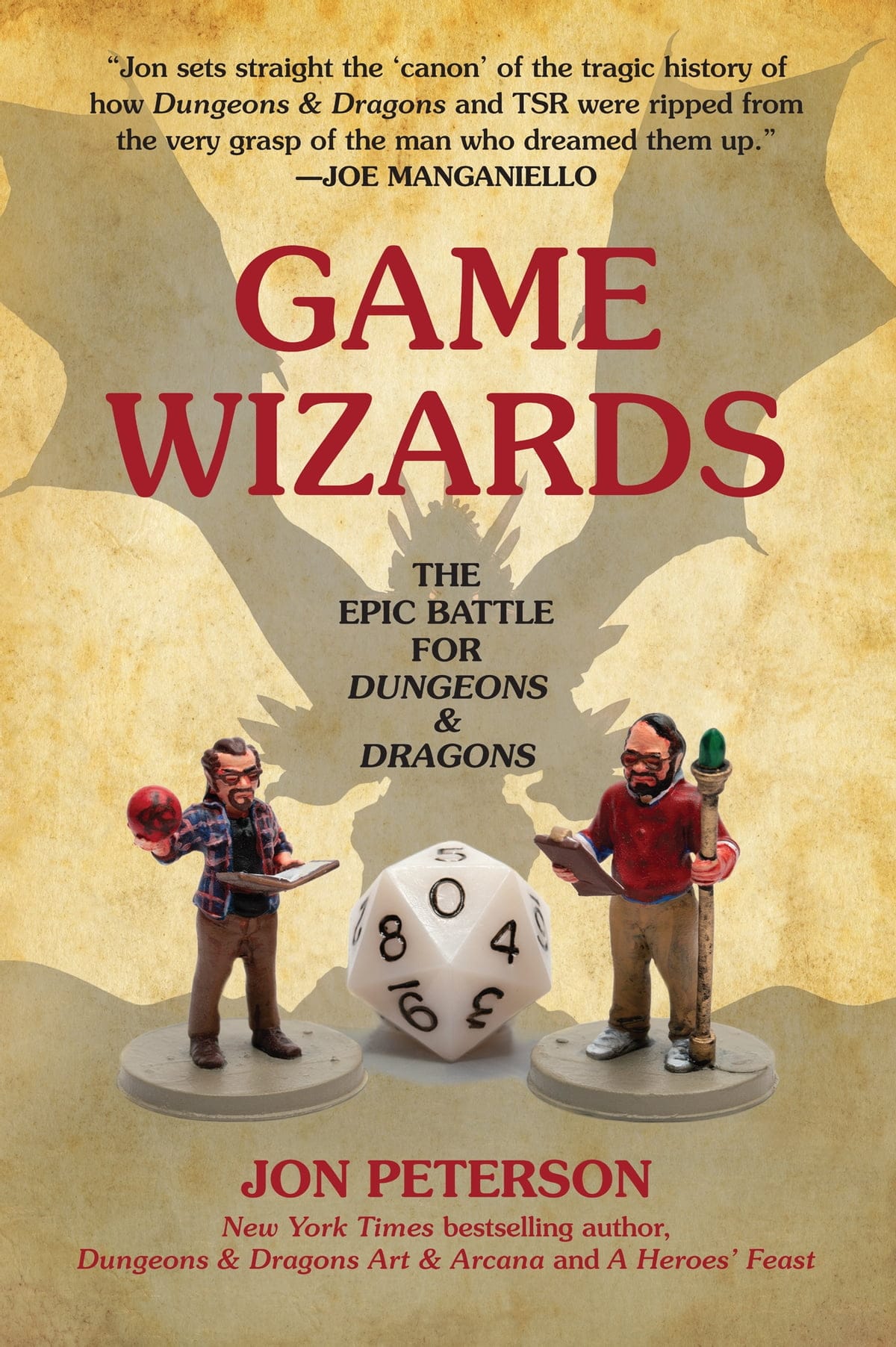
Game Wizards, the latest book from RPG historian Jon Peterson, begins with a standoff. It’s 1985 and in a board meeting attended by the main shareholders of TSR, the original publishers of Dungeons & Dragons, Gary Gygax is about to discover he’s lost control of both the company and game he created. Having given us this brief glimpse of the story’s dramatic conclusion Peterson takes us right back to beginning, the tail end of the sixties and the first fateful meeting of the game wizards of the title, Gygax and Dave Arneson, who would both lay claim to be being the inventor of D&D.
Few can compete with Peterson's encyclopedic knowledge of D&D, and role-playing games in general, as seen in books such as Playing at the World and The Elusive Shift, and in his usual, meticulous, manner this is a wonderfully deep dive into what he calls the ‘Epic Battle for Dungeons & Dragons’, first between Gygax and Arneson and then Gygax and his corporate partners, the Blume family and, ultimately, Lorraine Williams.
From the beginning it’s fair to say that Arneson and Gygax’s relationship is tricky. If you had friends who were dating with similar vibes, you’d be silently willing them to chill out and break up. Despite this they, initially, have a fruitful creative partnership but that soon sours and barely two years from D&D's commercial release Arneson walks away from TSR before Gygax can demote him, ostensibly for not coming into the office, from Director of Research to a job in shipping.
TSR, of course, continues with D&D releasing a raft of new books as the decade progresses and the acrimony between an embittered, exiled Arneson and Gygax takes on main character energy throughout the book. Still there are lots of fascinating details to discover outside of their spat, from the origin of the terms “role playing game” and “dungeon master” and seeing beloved publications -such as the first ever Players Handbook- emerge, to learning some of Gygax’s more flavoursome insults - “jealous orks” and “a two faced shaft master” are just two recorded for posterity here- and there are peeks behind the scenes with Peterson making liberal use of the TSR's in-house publication, Random Events, and lots of original illustrations, documents and pictures further fleshing out the story.
As you'd expect from Peterson the research is thorough but moreover this is a true page turner as each chapter covers a year marked by turbulent exchanges, be they with lawyers or competitors, personality clashes within the company and, towards the end of the seventies, rapid expansion, huge influxes of cash and the start of some truly wild spending that would eventually lead to quixotic projects like exhuming a sunken ship from Lake Geneva or even attempting to sponsor the US Olympic bobsled team.
Throughout the book are plenty of show stopping moments to enjoy as the roleplaying game industry seems, at least at first, to inexorably grow and each year is punctuated by rival conventions and releases. The ceremony where Arneson plays Kanye to Gygax’s Taylor Swift, snatching an award from right out under his nose being a particularly notable incident.
As the 70s gives way to the 80s we also get to experience the “satanic panic” from the inside. After the disappearance of a student from Michigan State University is blamed on D&D and the story goes nationwide the game suddenly has a notoriety like never before. Initially this provides a huge boost to sales but soon televangelists are declaring D&D to be the devil’s work and anti-occult organisations are campaigning against the game. It’s fascinating to see how this affected the company with Gygax, perhaps not too reluctantly, becoming a public figure to answer the game’s detractors.
The picture Peterson paints is of a dysfunctional company, one that is often out of its depth, and the fact that D&D survives and thrives to this day is testament to the many passionate staff, who despite the machinations and chaos behind the scenes, generously shared their imaginations and creativity with us. In truth neither Gygax, Arneson nor the Blumes come out of the story particularly covered in glory. Still, without the initial vision and drive of these Game Wizards the world would indeed be a drearier place, and it all makes for an enthralling story at any rate.
Last year I had a chance to speak to Peterson and asked him what he’d gleaned from all his research. “The success of games depends on the communities that play and nurture them - and the origins of games do too," he told me. "No matter how novel an idea is, or how successful it becomes, ideas emerge from communities, and success just means that a community is ready for the idea. Game designers who forget that tend to lose their way. If you are fortunate enough to know real success, don't ever believe it was all you.”
Author: Jon Peterson
Published by The MIT Press
This feature originally appeared in Wyrd Science Vol.1, Issue 3 (Oct '22)

